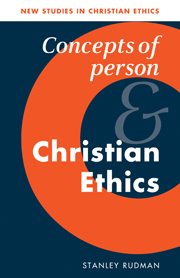Book contents
- Frontmatter
- Contents
- General editor's preface
- Acknowledgements
- List of abbreviations
- Introduction
- PART I ‘PERSON’ IN CONTEMPORARY ETHICS
- 1 ‘Une catégorie de l'esprit humain: la notion de personne’
- 2 Meaning and criteria: person/human being
- 3 Moral personhood in M. Tooley and P. Singer
- 4 Personal identity and responsibility in D. Parfit
- 5 Human subject and human worth
- 6 Resituating personhood: embodiment and contextuality
- PART 2 ‘PERSON’ IN CHRISTIAN PERSPECTIVE
- PART 3 IMPLICATIONS FOR A CHRISTIAN ETHIC
- Conclusion
- Notes
- Select bibliography
- Index of subjects
- Index of names
4 - Personal identity and responsibility in D. Parfit
Published online by Cambridge University Press: 02 December 2009
- Frontmatter
- Contents
- General editor's preface
- Acknowledgements
- List of abbreviations
- Introduction
- PART I ‘PERSON’ IN CONTEMPORARY ETHICS
- 1 ‘Une catégorie de l'esprit humain: la notion de personne’
- 2 Meaning and criteria: person/human being
- 3 Moral personhood in M. Tooley and P. Singer
- 4 Personal identity and responsibility in D. Parfit
- 5 Human subject and human worth
- 6 Resituating personhood: embodiment and contextuality
- PART 2 ‘PERSON’ IN CHRISTIAN PERSPECTIVE
- PART 3 IMPLICATIONS FOR A CHRISTIAN ETHIC
- Conclusion
- Notes
- Select bibliography
- Index of subjects
- Index of names
Summary
Another writer who has made the concept of ‘person’ central to his understanding and development of moral theory is D. Parfit, initially in a number of articles1 and subsequently in Reasons and Persons. Unlike the previous authors we have considered, he concentrates on the significance of personal identity for an understanding of personhood, which can be applied in a wide range of moral issues, not simply issues which concern the beginning and end of life or non-human animals.
In his earlier articles Parfit argued for a Humean view of personal identity in which pyschological continuity or connectedness between different phases of a person's life exhausts the significance of personal identity. There is no further ‘deep’ fact, such as the persistence of a separate self over time. Radical discontinuity between our earlier and later selves should be acknowledged even if this seems to imperil the concept of responsibility for earlier actions. Like rivers which go underground, merge and reappear, like volcanoes which erupt, subside, lie dormant, and start again, or like nations, which change their boundaries, their membership, and their character, we are only in a weak sense the same persons that we used to be.
In Reasons and Persons he argues at greater length for the adoption of a reductionistic view of personal identity on the ground that this would contribute to a more consistent and effective moral theory.
- Type
- Chapter
- Information
- Concepts of Person and Christian Ethics , pp. 60 - 74Publisher: Cambridge University PressPrint publication year: 1997



